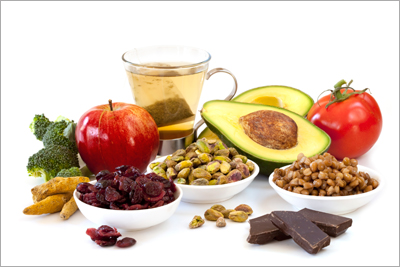Superfoods: Do We Need Them?
The power of superfoods.
7 September 2014
ewfood

We hear about the latest “superfoods” from so many different sources these days, all offering us information about the foods we really should buy to keep ourselves and our families in the best of health. But are these foods really as super as the claims would have us believe?
Firstly, what is meant by the term superfood? Basically, it is a word used in marketing to describe foods that are supposed to be beneficial for our health, helping to combat medical conditions or reducing the risk of developing certain diseases. For example, antioxidants and vitamins found in blueberries are sometimes said to offer protection against heart disease, some cancers and memory loss; it has been claimed that the high concentration of nutrients in wheatgrass reduces inflammation, helps the production of red blood cells and aids circulation; it has been suggested that brain activity and the immune system might be boosted by eating dried goji berries. These are just a few examples, I could go on!
However, superfood is not a term accepted for use in medicine, by dieticians or those involved in nutrition, who may not always accept the claims of those promoting these foods. In fact, this term is not allowed to appear on labels and packaging under rules governing food advertising in the UK.
So, are superfoods merely a product of clever commercial marketing, focusing our minds in the supermarket on buying foods they suggest we should have rather than foods we’d like to buy, or is there some substance to the claims put forward? It’s not possible here to discuss the merits of each and every one, but here are some thoughts about the pros and cons of the matter:
- A lot of these foods have a long track record, being used through history, embedded in a wide variety of cultural traditions, to aid health or ease a range of ailments and conditions. For example, the juice and seeds of the pomegranate are said to have been regarded as beneficial to health in the Middle East for thousands of years. And there’s no doubt that many of these foods may have a particularly high content of one or more substances known to be beneficial in maintaining a good healthy diet, such as antioxidants, specific vitamins and minerals, or other important elements in nutrition. But they cannot be depended on to act as magic short cuts to substitute a balanced diet, or to make up for the shortcomings of a poor one.
- Scientific findings put forward by advocates of a specific superfood can sometimes be disputed, for various reasons. Some studies may involve sample groups that are too small to provide definite proof, or trials may be too short to produce satisfactory results, meaning that there is insufficient evidence to back claims. Research might use extracts of a food that is far more concentrated than that found in the product normally, meaning that any health benefits are not fully proven. Or different studies into the same food may simply be contradictory! Often it seems to be the case that more research is needed to investigate claims fully as findings are inconclusive.
- Some superfoods may have drawbacks as well as benefits that need to be considered. For example, cocoa in dark chocolate is thought by some to have benefits in promoting cardiovascular health, but you need to remember that, unfortunately, it also contains fat and sugar! So, like many foods, it needs to be eaten in moderation.
- Some superfoods seem to have better claims nutritionally than others; for example, salmon, as an oily fish, seems to be broadly accepted as being helpful towards maintaining healthy blood pressure and clearer arteries. However, other oily fish such as mackerel and sardines could claim the same health benefits but cost less. Similarly, spinach and broccoli contain vitamins, iron and calcium but are cheaper and more easily available than wheatgrass.
To sum up, it seems to me that many of the promoted superfoods could be of some benefit if you want to eat them, but as part of a sensible healthy diet of fresh foods rather than as an alternative. By all means include blueberries in your diet if you wish, but eat other fruits too like blackberries and raspberries, and kiwi fruits which are similarly high in vitamins. We need to eat a “rainbow” of fruit and vegetables to get a range of different nutrients, along with a balanced diet containing foods such as oily fish, pulses, whole grains for fibre etc., to keep ourselves well. And, just as importantly, try to reduce our intake of salt, sugar and saturated fat, and avoid too much processed food.
Liz Robb for ExpatWoman.com














